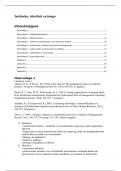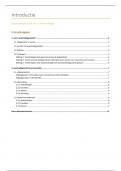College aantekeningen
College aantekeningen Instituties, identiteit en imago + opdrachten
College aantekeningen van het vak Instituties, Identiteit en Imago zonder college 3. Alle vier de gemaakte opdrachten staan ook hierin, heb het vak afgerond met een 7.2
[Meer zien]







